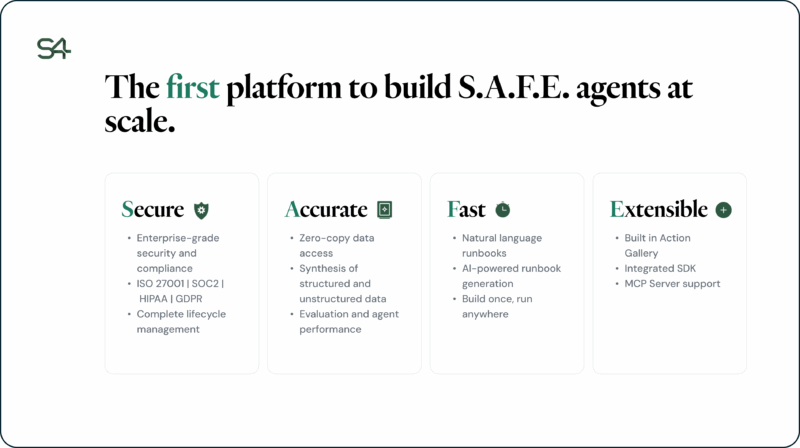Choosing among the top AI platforms: what matters most
The promise of artificial intelligence in the enterprise has long been compelling, but the reality of achieving widespread, impactful deployment has often been challenging. While SaaS applications have streamlined specific business functions and analytics platforms have provided valuable insights into historical data, the true potential of AI lies in its ability to act – to move beyond looking in the rearview mirror and autonomously execute complex work that drives outcomes. This is the era of the enterprise AI agent, and 2025 is the year they become indispensable.
Enterprise AI agents are not just sophisticated chatbots or simple automation tools. They are intelligent systems capable of understanding context, reasoning, making decisions, and taking action across disparate enterprise applications and data sources to achieve specific goals. For large organizations grappling with complexity, data silos, and the need for increased productivity and agility, selecting the right AI agent platform is a critical strategic decision.
This buyer’s guide explores the top considerations when selecting AI agent platforms for the enterprise in 2025, analyzing their strengths and target use cases to help you navigate this dynamic landscape.
Understanding the enterprise AI agent landscape
The market for AI agent platforms serving the enterprise can broadly be segmented into a few key categories, each with a different approach and ideal user profile:
- Ecosystem-centric platforms: Offered by major tech giants, these platforms leverage deep integration within their existing software ecosystems.
- Purpose-built platforms: These solutions focus on solving specific, often complex, problems within a particular domain or industry.
- Developer-focused frameworks: Providing maximum flexibility and control, these are toolkits for developers to build highly customized agent solutions.
- Horizontal platforms: Designed to empower a broader range of users (including business users) to build, deploy, and manage agents for diverse use cases across the enterprise.
The benefits of using AI platforms in the enterprise
Enterprise AI platforms are revolutionizing how organizations operate, delivering unprecedented value by enabling businesses to scale their operations efficiently while maintaining rigorous control and governance. By implementing a comprehensive AI platform, enterprises can dramatically improve business outcomes through automated workflows, enhanced decision-making capabilities, and data-driven insights that were previously unattainable. These platforms significantly strengthen compliance measures by ensuring consistent application of policies and maintaining detailed audit trails of all AI operations. Furthermore, they help organizations reduce operational risks through built-in governance frameworks, secure data handling protocols, and transparent AI operations that can be monitored and adjusted in real-time. The ability to deploy AI solutions across multiple business units while maintaining centralized control and visibility enables enterprises to achieve transformative results without compromising security or regulatory requirements.

Top AI agent platforms for the enterprise in 2025
Here are some of the leading players in the enterprise AI agent platform space:
- Sema4.ai: Positioning itself as an enterprise AI agent company, Sema4.ai offers a horizontal platform built for business users and ISVs. Their focus is on enabling organizations to build, run, and manage SAFE (Secure, Accurate, Fast, Extensible) agents for complex knowledge work. Key strengths include a natural language interface for agent creation (Studio with Sai and Runbooks), robust integration capabilities via Actions and an SDK (with upcoming MCP support) for high extensibility, enterprise-grade security and governance (Control Room, VPC deployment), and specialized Document Intelligence for handling complex unstructured data with accuracy. This platform is particularly well-suited for enterprises looking to empower business process owners and data app developers to drive automation across a wide range of use cases securely and at scale, and for ISVs seeking to embed trustworthy AI agent capabilities.
- Microsoft: With a broad portfolio including Microsoft 365 Copilot, Copilot Studio, and tools like AutoGen and Semantic Kernel, Microsoft offers AI agent capabilities deeply integrated into its extensive ecosystem. Their strength lies in providing AI assistance and automation within familiar productivity tools and business applications. Microsoft’s approach is strong for organizations heavily invested in their ecosystem, offering solutions that can enhance existing workflows and provide AI-powered assistance to a wide user base. For complex, cross-application autonomous workflows outside the Microsoft ecosystem, additional integration work may be required.
- Salesforce: Focusing on the CRM domain, Salesforce’s Agentforce aims to embed AI agents within sales, service, and marketing workflows. Leveraging their deep understanding of customer relationship processes and vast amounts of CRM data, Salesforce is well-positioned to provide agents that enhance customer interactions and automate sales and service tasks. Their platform is a strong contender for enterprises standardized on Salesforce, enabling them to operationalize AI directly within their customer-facing operations. Extending these capabilities broadly across other enterprise functions may require leveraging their integration capabilities like MuleSoft.
- IBM watsonx: IBM’s watsonx platform offers a suite of AI tools, including capabilities for building and deploying AI agents. With a focus on enterprise-grade features, governance, and industry-specific solutions, IBM is targeting complex automation and AI-driven decision-making within large organizations. Their strengths lie in providing a secure and scalable platform with pre-built agents and tools for developers to build custom solutions, particularly in areas like HR, sales, and procurement. IBM’s long history in enterprise software and consulting can be an advantage for complex deployments.
- Google Cloud (Vertex AI Agent Builder): Google Cloud’s Vertex AI Agent Builder provides tools and infrastructure for developers to build and deploy generative AI agents. Leveraging Google’s strengths in AI research and cloud infrastructure, this platform offers flexibility and scalability for creating custom agent solutions. It is suitable for enterprises with strong development teams looking to build bespoke AI agents and applications on a robust cloud platform.
- CrewAI: A popular open-source framework, CrewAI is designed for orchestrating multi-agent systems where different AI agents collaborate to achieve a common goal. Its Python-based nature makes it powerful and flexible for developers to build complex, role-based agent workflows. CrewAI is an excellent choice for enterprises with strong AI development teams who require granular control and customization over agent interactions and workflows. However, it requires significant technical expertise to deploy and manage at an enterprise level, and built-in security and governance features need to be implemented by the user.
- LangChain: Another widely adopted open-source framework, LangChain provides a toolkit for developing applications powered by language models, including agents. It offers a flexible way to chain together different components (models, APIs, data) to create custom agent behaviors. Like CrewAI, LangChain is ideal for technical teams who need to build highly customized solutions and have the resources to manage the development lifecycle and implement enterprise-grade requirements like security and scalability.
- Sierra: Focused on conversational AI agents, Sierra specializes in transforming customer service interactions for consumer brands. Their platform aims to provide human-like, brand-aligned AI agents that can handle customer inquiries and perform actions within CRM and order systems. Sierra is a strong contender for enterprises primarily focused on enhancing their customer service operations with specialized, high-quality conversational AI.
- UiPath AI Center: While primarily known for Robotic Process Automation (RPA), UiPath has integrated AI capabilities, including AI agents, into its platform. This allows enterprises to combine traditional RPA with AI-driven intelligence to automate more complex, end-to-end business processes. UiPath AI Center is a strong option for organizations with existing investments in the UiPath RPA platform who want to infuse AI into their current automation workflows.
The importance of SAFE agents for the enterprise
For enterprise buyers, the trustworthiness of AI agents is paramount.
“No trust, no AI. You’ve got to understand that people are only going to use these agents and partner with them to do things if they trust them. So they’ve got to be safe, they’ve got to be accurate, they’ve got to be fast and responsive, and they have to be explainable. Trust is becoming the currency of innovation.” said Scott Hebner, Principal Analyst for AI at theCUBE Research.1
As these agents take on more autonomous actions with access to sensitive data and critical systems, ensuring they are SAFE is essential.

- Secure and governed: Enterprise agents must operate within defined security protocols and compliance standards (like SOC 2, ISO 27001, HIPAA, GDPR). Robust access controls and deployment options like running within a customer’s VPC are critical.
- Accurate and explainable: Agents need to handle diverse enterprise data, including complex unstructured documents, with high accuracy. Furthermore, enterprises need visibility into how agents arrive at decisions to build trust and enable auditing.
- Fast and easy: The ability for business users, not just developers, to quickly build and deploy agents is crucial for rapid time-to-value and scaling automation across the organization.
- Extensible and adaptable: Agents must seamlessly connect to the existing, heterogeneous enterprise IT landscape. Robust SDKs, pre-built connectors, and support for open standards like MCP enable broad integration and empower ISVs to build on the platform.
Choosing the right platform for your enterprise
For enterprise buyers, selecting an AI agent platform goes beyond just the core AI capabilities. Consider the following factors:
- Ease of use: Can business users participate in building and managing agents, or is it solely for developers? Platforms with low-code/no-code interfaces and AI assistance (like Sema4.ai’s Sai) can significantly accelerate adoption and scaling.
- Integration capabilities: How easily can the platform connect to your existing enterprise applications, databases, and unstructured data sources (including documents)? Look for robust SDKs, pre-built connectors, and support for standards like MCP.
- Security and governance: Enterprise-grade security, compliance certifications (SOC 2, ISO 27001, HIPAA, GDPR), data control (e.g., VPC deployment), and features for monitoring and auditing agent behavior are non-negotiable.
- Scalability and reliability: Can the platform handle the volume and complexity of your enterprise workflows? What is the uptime and how is reliability ensured?
- Accuracy and explainability: For critical business processes, understanding how an agent arrived at a decision is vital for trust and auditing in the enterprise. Look for platforms that prioritize accuracy in data handling (especially complex data types) and provide transparency into agent reasoning.
- Use case breadth vs. specialization: Do you need a platform to address a wide range of use cases across the enterprise (horizontal) or a highly specialized solution for a specific problem?
- Agent orchestration – Agentic orchestration refers to the process of coordinating and managing the activities of one or more AI agents to accomplish a complex task or workflow. Developer-focused frameworks like CrewAI and LangChain are explicitly designed for building and orchestrating multi-agent systems and complex workflows programmatically.
While ecosystem and purpose-built vendors offer solutions within their specific domains, and developer frameworks provide flexibility for technical teams, a horizontal platform with a strong emphasis on SAFE principles like Sema4.ai is designed to empower a broader range of enterprise users to build, deploy, and manage trustworthy AI agents for diverse and complex workflows at scale.
The best AI agent platform for your enterprise will depend on your specific needs, existing IT landscape, technical resources, and desired pace of AI adoption. Carefully evaluate each platform based on the criteria that matter most to your organization’s strategic goals for AI automation.
- Mark Albertson, “The rise of digital co-workers: Sema4.ai’s blueprint for trusted agentic AI”, https://siliconangle.com/2025/08/20/digital-labor-sema4-trust-ai-aiagentbuilder/ ↩︎


